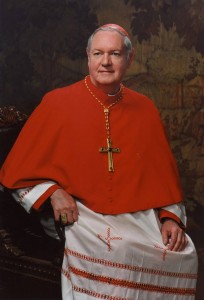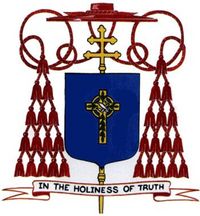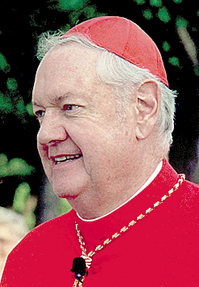The Sacrifice of the Mass was
celebrated by the Rev’d Father James Miara (a man ordained by the cardinal), assisted by the Rev’d Father Michael Barrone (Newark Archdiocese) and the Rev’d Father Richard Trezza, OFM, deacon and subdeacon respectfully. Nearly 400 people were in attendance.
The Cardinal focussed his homily on three points: the Solemnity of the Annunciation of the Lord, the 15th anniversary of
Evangelium Vitae (1995) and the Mass. All three foci speak one language of obedience, though not an obedience of acquiescence to the will of another, but of an obedience that is filled with joy, done willingly and loyally.
The Blessed Mother sets the tone; some might say her life is a poem of love. From the earliest days of the Church the BVM has been an example of how to obey. She is an example for Catholics, particularly in difficult times, of how to live in manner filled with joy by abiding by God’s law joyfully, willingly, enthusiastically and loyally.
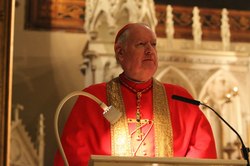
The late Pope John Paul II’s encyclical Evangelium Vitae taught that every human person is precious beyond expression, a mirror held up to the divinity. And thus, every person deserves respect. The encyclical opens with the words “The incomparable worth of the human person,” and then proceeds to lay out for the reader the roots of human dignity from Genesis, Deuteronomy, the Gospels, Saint Paul, Saint John and the natural which is written in the heart of all people.
In fact, the cardinal used an architectural image of sculpting to speak of the natural law being in our hearts and minds paying close attention to the reasonableness of the natural law which guides the human faculty of understanding. The natural law for us, pre-dates the fact of religion. That the natural law is written on the human heart we understand it’s function as being protective of life. People of reasonable mind, therefore, argue that the natural law applies equally to the baby in the womb as to the elderly woman in the wheelchair. Egan’s mantra becomes ours as it is our humane job is to protect life joyfully, willingly and loyally. And as the Blessed Mother gave her ‘yes’ to God, we ought to do the same for ourselves and for all of life at all its stages.
Apparently the cardinal watches National Geographic films these days. He highly recommended 2 films: “
In the Womb” and “
In the Womb – Multiples.” Both of these films show the great miracle of new life– alive, innocent and smiling. Only Egan would talk about Aristotle’s quip that the sign of a human being is his ability to smile. One would think that man’s ability to smile is linked to rationality and that the high tech photography of pre-born babies show them smiling would convince the cold rationalist to admit that which is in the woman womb is not fleshy stuff but a human being, an innocent baby. I suppose the non-smiling among us aren’t human yet. I wonder. Could Aristotle be correct?
Egan uttered the pious ejaculation: “Yes, Lord, we will defend children from conception to their natural end.
Ordained a priest in Rome in 1957 by Archbishop Martin J. O’Connor, a man for whom His Eminence has had the “greatest respect,” the themes imprinted on Egan’s heart were that of loyalty and obedience (lived joyfully and willingly, of course). Egan expressed his love for the Ordinary and the Extraordinary Forms of the Mass. As he said, he’s an obedient and loyal son of the Church and since Pope Benedict has determined the Church needs two forms of the Mass, he abides. In fact, the cardinal indicated that he “hears the voice of the Church as the will of God.” Benedict’s motu proprio Summorum Pontificum allows for the Missal of Blessed John XXIII to flourish and it deserves all people’s respect and love. Egan encouraged all to follow and truly embrace the faith as it is lived in sacred Scripture, sacred Tradition and the Magisterium of the Catholic Church.
Brought together, the priest and the faithful are to adjust to the leadership of the Catholic Church as Mary was obedient to God in Gabriel announcement of the Day of Redemption and as Pope John Paul II taught in Evangelium Vitae and as Pope Benedict in making the 1962 Missal a respectable form of worship consistent with theological and liturgical tradition.
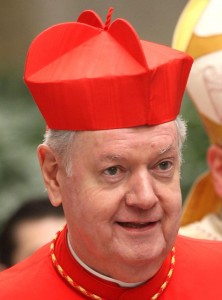 Edward Michael Egan laid to rest at St Patrick’s Cathedral.
Edward Michael Egan laid to rest at St Patrick’s Cathedral.


